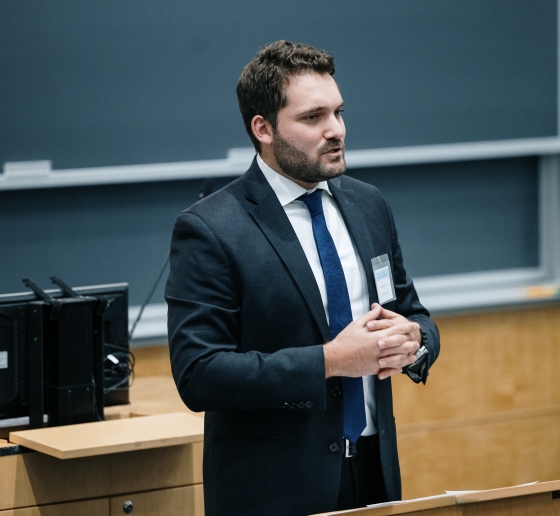Student Spotlight: Dakota Fenn ’24
Fenn is a finalist in the 2024 Harlan Fiske Stone Moot Court Competition.

Dakota Fenn ’24 first became interested in international law as an undergraduate; at Columbia Law School, he doubled down on the subject: Fenn was co-president of the Columbia Society of International Law and is currently the public affairs editor of the Columbia Journal of Transnational Law. Now a finalist in the Harlan Fiske Stone Moot Court Competition, Fenn talks about his path toward a career in government service.
Hometown: Westwood, Massachusetts
Education: A.B. in international relations and Latin American studies at Brown University
Before Columbia Law: Worked on two U.S. Senate campaigns for Democrats: Barbara Bollier in Kansas and Joseph P. Kennedy III in Massachusetts
At Columbia Law: Max Berger ’71 Public Interest/Public Service Fellow; James Kent Scholar; public affairs editor of the Columbia Journal of Transnational Law; co-president of the Columbia Society of International Law; research assistant to Sarah H. Cleveland, Louis Henkin Professor of Human and Constitutional Rights, during her candidacy for the International Court of Justice (ICJ), and Gillian Lester, Dean and Lucy G. Moses Professor of Law
You worked for two United States Senate campaigns before law school. Tell us about those.
I thought I wanted to work in policy, and one thing everyone said was that you learn the most about what matters to communities when you’re on the campaign trail. I learned a lot about community organizing, building relationships, and what it means to be able to communicate effectively with people. It was a great experience, even though both campaigns were ultimately unsuccessful.
What made you want to go to law school?
It was a combination of seeing on the campaign trail how the law concretely impacts people’s lives and also my academic interest in international law. Columbia has a history of expertise in international law, and I understood I was coming to a place where I would be able to engage with the things I wanted to engage with.
What have you focused on during your time here?
I’ve tried to focus on human rights and different human rights systems, including the Inter-American System and transitional justice. I did my 1L internship with Dejusticia in Bogotá, Colombia. It was a good experience in the human rights/NGO space. One thing I learned is the amount of time it can take to get some policy projects across the finish line, but I appreciated getting to dig into an issue and think about paths for resolution.
You also interned at the U.S. Department of State as a legal adviser and served as a research assistant for Professor Sarah Cleveland during her candidacy for the ICJ. What were those experiences like?
I hadn’t had a role in the federal government before and was trying to figure out if that was an environment I wanted to be in. I learned that it is definitely something I’m interested in. I got to see how different agencies with different expertise work together to devise a solution in the best interests of the people involved.
With Professor Cleveland, it was an exciting time. I was part of a team working to prepare her for meetings she was having to discuss her campaign with officials from the U.N. and various governments. It was a great experience.
What made you want to sign up for the Harlan Fiske Stone Moot Court Competition?
For one thing, it was an opportunity to get some more experience in litigation. Another draw was working with a partner. As law students, we don’t get to do that often enough. Teamwork is important in the legal profession. Third, a lot of us in law school enjoy thinking about new legal issues—trying to grapple with them and figure out the puzzle. This was a chance to do that.
What’s next for you?
I enjoyed my time at the State Department, and hopefully, that’s where I’ll end up. It’s the perfect marriage of my interests in government service and international law.